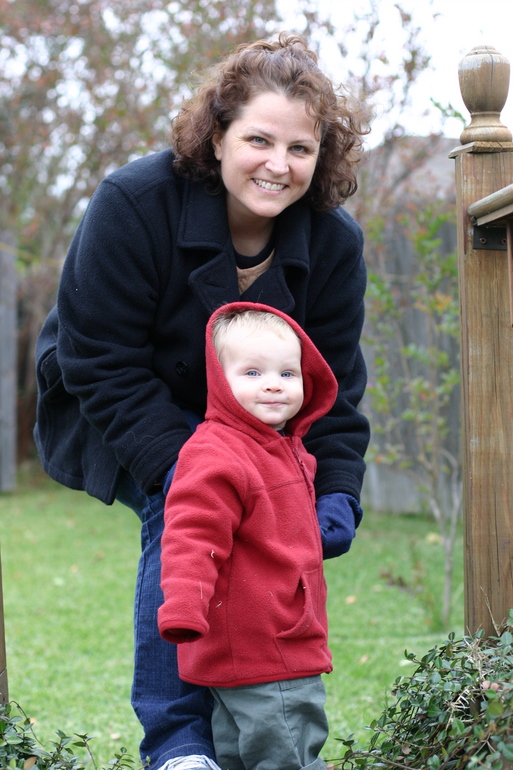
 Happy thanksgiving everyone! I have much to be grateful for. Here’s me with my son, both of us stuffed full of turkey.
Happy thanksgiving everyone! I have much to be grateful for. Here’s me with my son, both of us stuffed full of turkey.
Deadline extended… multiple meaning
I just learned that the Give 1 Get 1 program to purchase two XO laptops has been extended through December 31st. Hurrah!
I’ll admit it – my first thought was, good, I can delay that $400 escaping my bank account until after the holidays. But my second thought was, “Say, we can work more on the simplified user guide to get a nice PDF and even more language translations!”
Wiki writing workflow
I said I’d try to describe the workflow of wiki to Author-it. It’s pretty feeble and I really want better ideas so feel free to offer up your thoughts here.
Some history on the legacy. The file started out as a Google Document, which basically meant it had nice clean HTML code underneath and could be written on collaboratively and shared discerningly. The links to the wiki URLs were actual URLs rather than the wikitext linking code. The text contained a bit of passive voice and was more descriptive than task oriented.
Always start with task analysis
Once I read it, I did some task analysis, which is available in this published Google spreadsheet. I broke down the tasks based on whether the user was a kid, a parent, or a teacher using the XO. Then Emily Kaplan and I started re-writing the sections and adding section (or topics) based on the task analysis. First we tried writing each topic as an unpublished WordPress blog entry, thinking that we could eventually get translations done using the Worldwide Lexicon open source initiative. An interesting concept, perhaps well-matched to the spirit of the OLPC project, but we learned that maintaining a Table of Contents would be difficult, and also found that the Laptop.org folks like SJ Klein really wanted the wiki at wiki.laptop.org to be the source for all content.
Wiki as source
I completely agree with this wiki-centric approach and we have adapted. All the WordPress entries (there were less than eight of them) went into the Google doc, and then Todd Kelsey “wikified” the Google doc by saving it as Word, then using a visual basic script to convert to wikitext. We lost all the graphics placement but were able to get a wiki page going with the Google doc.
Word to Author-it…
During the same week’s time, I had taken the Word document saved from the Google document and imported it into Author-it in the instance donated by Author-it (thanks so much) on a server donated by Hostway (again, thanks) and that import worked really well with graphics and links and pretty much everything intact.
Wiki to Author-it… and back again
But this is where the wiki as source becomes difficult, right? Any changes that are made to the wiki must come over to Author-it, and that’s a manual and “think-tual” process. And I’m behind and should stop writing this blog post and go work on synching and writing more topics based on the task analysis. 🙂
Localization
As far as translations go, there were several translations done of the document when it was still in Google docs. Interestingly, many of the translators wanted Word documents to work in. Again, though, with wiki as source, I have linked to the translated files in hopes that others will pick up and wiki-fy the translations. One area I’m still learning about is whether the wiki engine has tools for the editors of translated pages to keep up with changes made to the English version and vice versa (if changes were made to the Spanish version of the wiki page, how could we incorporate those into the English version of the wiki page?)
Wikitext, wikitalk
I’m learning so much more about wikis (especially wikimedia) from this hands-on experience – such as “signing” notes with ~~~~ to get your username and a time date stamp automatically, and using “talk” pages to communicate with others on the wiki by posting notes for another user.
XO User Club in Austin
I’m also committed to starting an Austin-based XO User Club, following Robert Nagel’s lead with his excellent blog post and article in OLPC News. Let me know your thoughts here – I would like to see if we could meet at one of the Austin public libraries, probably on one Saturday a month (although we’ll be competing with soccer and other Saturday activities). We might have to play it fast and loose for a while and see what type of core group we gather. There’s a User Groups wiki page at http://wiki.laptop.org/go/XO_Giving/Users and it’s great to see where the groups are cropping up.
How to help
If you’re interested in writing more of the user guide for the laptop, all are welcome to contribute to the wiki page at http://wiki.laptop.org/go/Simplified_user_guide. Use the task analysis as your starting point if you want to start a new topic. I’m also seeking a page layout person with Word expertise to get a nice square manual that Lulu.com could easily print. Graphics to explain procedures, especially using the Activities, are always welcome over text. Join the OLPC Library mailing list where we discuss documentation and e-books for the XO.
Also, consider using the give one get one program to give the “get one” to some deserving kid in Austin, especially now that the GIG1 offer is extended. I’d buy ten of them if I could, to start the XO kids club with no “entry fee.”
Also, join us at the XO club meetings, with or without an XO, if you’d like to bring your Linux or Windows laptop and emulate Sugar, the XO’s operating system. EToys and TamTam experts are welcome.